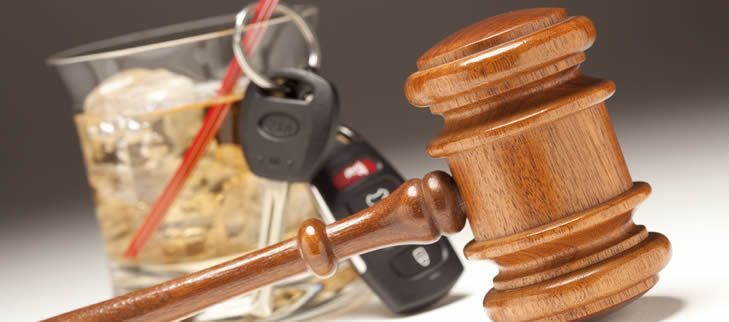
The holiday season boosts the chance for family gatherings, good times and happy memories. While you may be focused on holiday dinners or where you’ll find some post-holiday shopping deals, you should be alert about keeping yourself safe from getting a DUI charge. This time of year, many people find themselves indulging in too many beverages before getting behind the wheel, and police officers are more than ready to pull them over. First off, why do DUI arrests increase around the holidays? There are many concrete reasons why we tend to see a rise around this time of year. It’s no secret that the holiday season is filled with special drinks to help everyone feel more festive. Whether it’s a glass or two of champagne or a holiday-themed cocktail, many people can lose track of how much they’re drinking as the holiday spirit sets in; especially people who are in a large group and among close friends and family. This can lead to adults — or even underage young adults — drinking excessively and attempting to drive home and risk accidents on the road. Plus, law enforcement patrols more during the holidays. Police officers are aware of the situation, and they know that overindulgence will lead someone to drive under the influence of alcohol. To fight this, many departments will increase the number of officers they have patrolling the community around this time of year. They may also organize with supervisors to set up DUI checkpoints on common areas. Common suggestions would be to arrange a ride, don’t drink at all, or keep track of your drink intake. If you plan on driving yourself home, you need to be extremely careful to keep track of how much alcohol you’re consuming over a particular period of time. Normally, this means having no more than one standard “drink” per hour. Also, remember that the amount of alcohol in one drink can vary depending on how it is made. For example, one 12 ounce bottle of beer may be 5% alcohol, but a heavier stout beer may be 8% alcohol; making it more than a standard drink. All in all, drive carefully! Police officers need a reason to pull you over for suspicion of driving under the influence such as lane swerving or speeding. If they do pull you over, you don’t need to be over the 0.08% legal limit to be charged — you could receive a charge if you are deemed to be incapable of driving safely, even if you’re under the legal limit. Drive cautiously and the law enforcement doesn’t have probable cause to pull you over in the first place. If you are charged and arrested for a DUI, it’s necessary to quickly retain the help of a skilled DUI attorney who can fight for your rights and work with you. (912)-660-8478 www.themontgomerylaw.com

Many people think domestic violence can only occur between romantic couples, but in the state of Georgia, the lawful definition of domestic violence is much broader; meaning it can affect families as well. It’s an issue that doesn’t get taken lightly and can result in serious legal consequences for you someone you know. What is domestic violence? ‘Georgia’s Family Violence Act’ defines domestic violence as battery, assault, stalking, criminal damage to property, unlawful restraint, criminal intrude, and/or any felony committed by one household member against another. When understanding domestic violence, it’s basically certain acts that include physical violence, sexual assault, emotional abuse and other forms of damaging behavior. A common fallacy is that domestic violence only occurs between spouses or partners. Even though they make up a large portion of domestic violence cases, there are other situations that qualify as domestic violence. Georgia law refers to domestic violence as perpetrated against a “household member.” An exception to this rule would be parents of the same child. One parent can commit domestic violence against another regardless of whether or not they currently or have lived together in the past. The sentencing for convicted domestic abusers depends a great deal on the type of abuse committed, as well as how many previous convictions the defendant has, if any. First offenses are usually treated less harshly. However, any further charges will often result in stricter punishments than repeat offenses of the ‘regular’ form of the crime would demand. For example, when battery is committed against a household member, the offense is actually called family battery, but with regular battery, family battery convictions are considered a misdemeanor for the first offense. Once convicted, it can result in fines, probation, mandatory counseling or even jail time. Will a restraining order be involved in most cases? Yes. A court can issue a protective order to prohibit the abuser from contacting or going near the victim. In distinction, restraining orders are typically used in civil cases where one party feels threatened by another person’s behavior, but doesn’t necessarily involve physical violence. There might be a restraining order because of stalking or harassment incidents without any previous history of domestic abuse. If it’s a family ordeal, loss of custody or visitation rights with the children can take place during the process. Domestic violence incidents are always complex and require a lot of background information. It involves a lot of personal context and justifying circumstances. A simple misunderstanding shouldn’t lead to charges on a permanent record. If you or a loved one has been charged with domestic violence, or believe you may be charged with domestic violence, it’s time to seek assistance from an experienced attorney! (912)-660-8478 www.themontgomerylaw.com

In most cases, people who face legal charges and penalties are willing to accept responsibility for their actions and prove they are likely not to break the law for a second time. The Georgia legal system understands this and provides these offenders with a program to benefit them and clear their name. The Georgia First Offender Act aka “The Second Chance Law” allows some first-time offenders to avoid a conviction by completing certain requirements and getting the charge dismissed. Under this Act, eligible individuals can plead guilty without facing misdemeanor convictions. After you complete your sentence, the court drops the charge and your criminal record stays confidential to future employers. With the help of a skilled criminal defense attorney, first-time offenders may be able to alleviate many of their penalties that come with a criminal conviction. This certain Act applies to various charges, but excludes serious violent felonies, i.e. murder, and sexual crimes against minors. Basically, it’s a second chance created to help them recover and revitalize back into society without the burden of a life-long criminal record. This can drastically improve employment opportunities and the overall quality of a person’s life. How does the legal process work? First off, you and your attorney must ask to be sentenced under the First Offender Act. The program could include fines, court costs, and probation and jail time. The judge makes the decision on whether you are eligible or not after speaking with your attorney and the prosecutor. If there is a violation of the terms such as committing another crime, the judge will repeal your status and you will be convicted, as well as most likely face the maximum punishment. Upon completion of your sentence and you were successful, an order of discharge will be requested by the probation officer. If the defendant successfully completes all terms of the program and does not commit a new crime during the process, they won’t have a conviction. The order will be filed with the Clerk's office, and the Clerk will enter the order on your official Georgia criminal history record. This allows for your case to be sealed. However, lawyers, law enforcement officers, and judges will always be able to see the charge. Also, if you are arrested and convicted of another crime while still on first offender probation, your status from First Offender will be changed to a conviction. If you believe you or a loved one is eligible for the First Offender program, contact a professional criminal defense attorney today! It is in your best interest to start exploring this avenue first before being prosecuted. (912)-660-8478 www.themontgomerylaw.com
